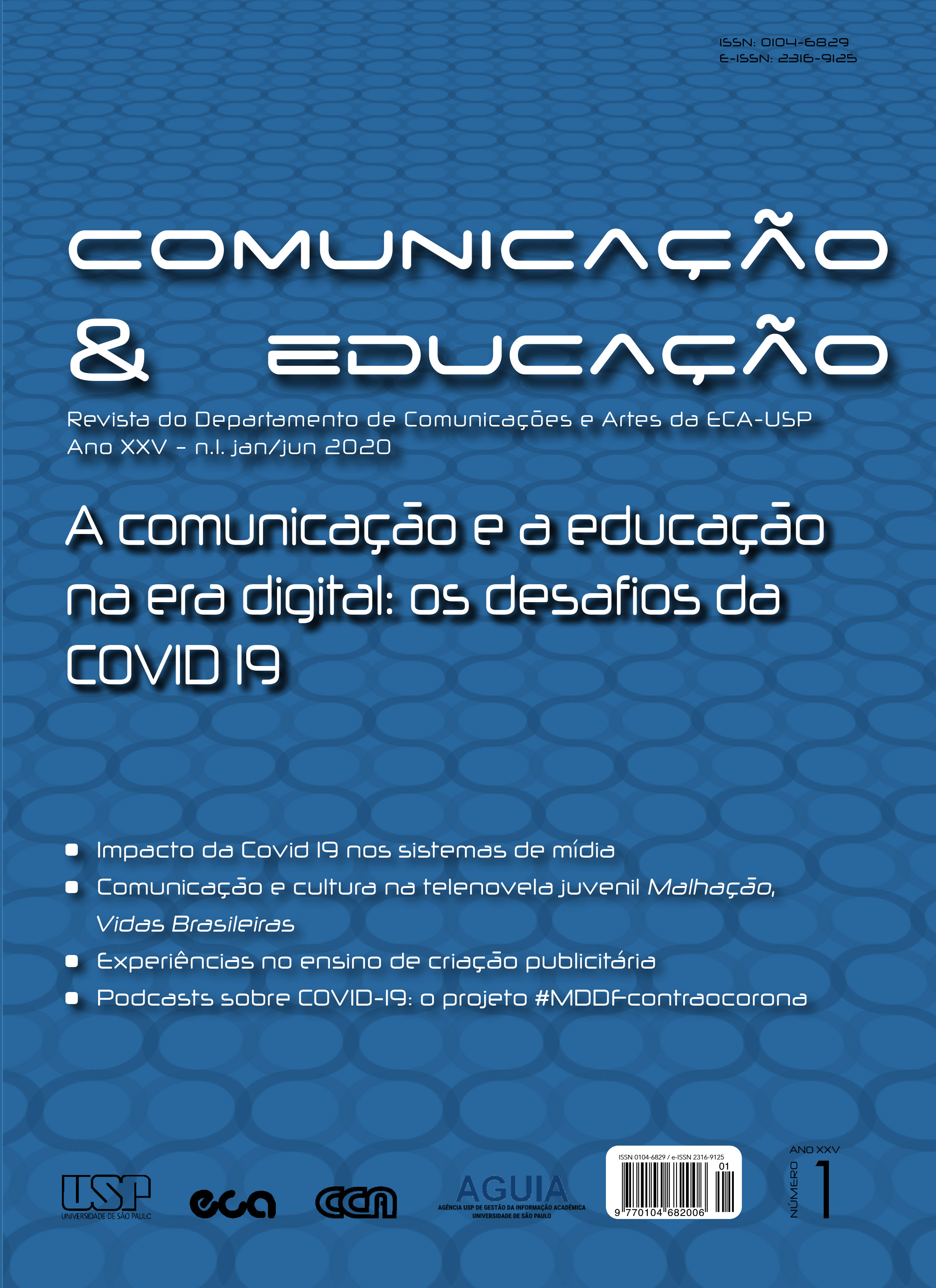Impacto da Covid-19 nos sistemas de mídia: consequências comunicativas e democráticas do consumo de notícias durante o surto
DOI:
https://doi.org/10.11606/issn.2316-9125.v25i1p109-129Keywords:
Covid-19, News consumption, Political communication, Democracy, JournalismAbstract
A Covid-19 é um fenômeno de enorme magnitude e relevância. Seu impacto tem afetado vários domínios sociais, incluindo as mídias e o jornalismo. Desde o início desta crise sanitária, as notícias se tornaram um recurso valioso para os cidadãos. Estudar as dinâmicas de consumo de informação é altamente relevante tanto por sua capacidade de transformar o sistema midiático quanto por seu impacto democrático. O objetivo desta pesquisa é analisar a influência do Coronavírus no consumo de notícias, a credibilidade dada pelos cidadãos à mídia e sua capacidade de detectar notícias falsas. Para responder a estas perguntas, se fez uma análise exploratória e inicial a partir de dados secundários das pesquisas on-line do Pew Research Center’s American Trends Panel nos Estados Unidos, fazendo comparações entre antes e depois do surto. Os resultados apoiam o impacto da Covid-19 no sistema midiático [...]
Downloads
References
BARLOVENTO COMUNICACIÓN. Cambio de hábitos y preferencias de la ciudadanía española frente al televisor por la crisis del Coronavírus. Informe especial, marzo 2020. Madrid: Barlovento Comunicación, 2020. Disponível em: https://www.barloventocomunicacion.es/wp-content/uploads/2020/04/Informe-especial-coronavirus-MARZO-2020-ACTUALIZADO.pdf. Acesso em: 28 set. 2020.
BENNETT, W. Lance; PFETSCH, Barbara. Rethinking political communication in a time of disrupted public spheres. Journal of Communication, Oxford, v. 68, n. 2, p. 243-253, 2018.
BENNETT, W. Lance; LIVINGSTON, Steven. The disinformation order: Disruptive communication and the decline of democratic institutions. European Journal of Communication, Thousand Oaks, v. 33, n. 2, p. 122-139, 2018.
CARLSON, Matt. Journalistic authority: Legitimating news in the digital era. New York: Columbia University Press, 2017.
CASERO-RIPOLLÉS, Andreu. Research on political information and social media: Key points and challenges for the future. El Profesional de la Información, [S. l.], v. 27, n. 5, p. 964-974, 2018.
CASERO-RIPOLLÉS, Andreu. Influence of media on the political conversation on Twitter: Activity, popularity, and authority in the digital debate in Spain. ICONO14, Madri, v. 18, n. 1, p. 33-57, 2020.
CHADWICK, Andrew. The hybrid media system: Politics and power. Oxford: Oxford University Press, 2017.
DAHL, Robert A. On political equality. New Haven: Yale University Press, 2006.
DUTTA-BERGMAN, Mohan J. Complementarity in consumption of news types across traditional and new media. Journal of Broadcasting & Electronic Media, Abingdon, v. 48, n. 1, p. 41-60, 2004.
ESSER, Frank et al. Political information opportunities in Europe: A longitudinal and comparative study of thirteen television systems. The International journal of press/politics, Thousand Oaks, v. 17, n. 3, p. 247-274, 2012.
EUROPEAN BROADCASTING UNION (EBU). COVID-19 Crisis. PSM Audience Performance, March 2020. Genebra: EBU, 2020. Disponível em: https://www.ebu.ch/publications/research/membersonly/report/covid-19-crisis-psm-audience-performance. Acesso em: 01 abril. 2020.
FEENSTRA, Ramón A. et al. La reconfiguración de la democracia. Granada: Comares, 2016.
GFK. Tracking semanal Covid-19 España. Píldora 4. 2020. Disponível em: https://cdn2.hubspot.net/hubfs/2405078/Email_Files/SEU_email_files/ES_files/GfK_PILDORA_4%20Spain.pdf Acesso em: 10 abril. 2020.
GIL DE ZÚÑIGA, Homero; DIEHL, Trevor. News finds me perception and democracy: Effects on political knowledge, political interest, and voting. New Media & Society, Thousand Oaks, v. 21, n. 6, p. 1253-1271, 2019.
GIL DE ZÚÑIGA, Homero; HUBER, Brigitte; STRAUß, Nadine. Social media and democracy. El profesional de la información, [S. l.], v. 27, n. 6, p. 1172-1180, 2018.
GIL DE ZÚÑIGA, Homero; WEEKS, Brian; ARDÈVOL-ABREU, Alberto. Effects of the news-finds-me perception in communication: Social media use implications for news seeking and learning about politics. Journal of Computer-mediated Communication, Hoboken, v. 22, n. 3, p. 105-123, 2017.
HABERMAS, Jürgen. Political communication in media society: Does democracy still enjoy an epistemic dimension? The impact of normative theory on empirical research. Communication Theory, Oxford, v. 16, n. 4, p. 411-426, 2006.
KOBLIN, John. The evening news is back. The New York Times, New York, March 24, 2020. Disponível em: https://www.nytimes.com/2020/03/24/business/media/coronavirus-evening-news.html. Acesso em: 28 set. 2020.
KOVACH, Bill; ROSENSTIEL, Tom. The elements of journalism: What newspeople should know and the public should expect. New York: Three Rivers Press, 2007.
LEE, Sangwon; XENOS, Michael. Social distraction? Social media use and political knowledge in two US Presidential elections. Computers in Human Behavior, Amsterdam, v. 90, p. 18-25, 2019.
NEWMAN, Nic et al. Reuters Institute digital news report 2019. Oxford: Reuters Institute for the Study of Journalism, 2019. Disponível em: https://reutersinstitute.politics.ox.ac.uk/sites/default/files/2019-06/DNR_2019_FINAL_0.pdf. Acesso em: 28 set. 2020.
VAN AELST, Peter et al. Political communication in a high-choice media environment: a challenge for democracy? Annals of the International Communication Association, Abingdon, v. 41, n. 1, p. 3–27, 2017.
WAISBORD, Silvio. Truth is what happens to news: On journalism, fake news, and post-truth. Journalism Studies, Abingdon, v. 19, n. 13, p. 1866-1878, 2018.
WILLIAMS, Bruce A.; DELLI CARPINI, Michael X. After broadcast news: Media regimes, democracy, and the new information environment. Cambridge: Cambridge University Press, 2011.
WOLTON, Dominique. Eloge du grand public: une théorie critique de la télévision. Paris: Flammarion, 1990.
Downloads
Published
Issue
Section
License
Copyright (c) 2020 Andreu Casero-Ripollés

This work is licensed under a Creative Commons Attribution 4.0 International License.
I authorize the publication of the submitted article and soon the copyrights to the magazine, in the printed and electronic version, if it is approved after the evaluation of the reviewers.
I understand that readers may use this article without prior request, provided the source and authorship are mentioned. Readers are not authorized to use this article for reproduction, in whole or in part, for commercial purposes.

































